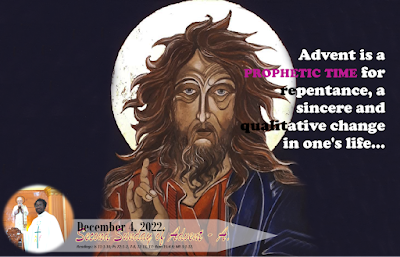The name of God is mercy
September 15 2019: Twenty-fourth Sunday in Ordinary Time
A German proverb says, “God forgives sinners, otherwise His
heaven would be empty.”
We are all sinners. That is an undeniable truth. We are born
in sin; we live in sin and we struggle as much as we can to not die in sin. However,
in our struggle against sin and all kind of evil, we are not left alone, by
ourselves. God is always by our side. Because, his name is mercy. Thus, St.
Paul, filled with assurance affirms, “where sin increased, grace overflowed all
the more” (Rom 5:20).
The liturgy of this 24th Sunday in the Ordinary
Time C is a canticle of God’s mercy. We are given to contemplate a God who loves
without taking merits into account. Because, God’s mercy goes beyond and before
human actions and merits. For matter of fact, God’s mercy is not something one
could say he or she deserved for having done anything for it. Is tis a gift
that we receive without nothing from our part.
Israel, the people of God, in their waywardness in the desert
experienced that extraordinary compassion and mercy of God which goes beyond the
enormity of their sin. In the desert, the people have turned away from the true
God who brought them out from Egypt. They worshiped idols, “making for
themselves a molten calf and worshiping it, sacrificing to it and crying out, 'This
is your God, O Israel, who brought you out of the land of Egypt!'”
Idolatry, is a mortal sin. It is about turning one’s back to
God and embracing other gods. It is a complete denial of the authority of God
in one’s life. It is a so severe sin that its punishment is death. Thus, God
will show his wrath to this idolater people promising to destroy them. But
then, after the mediation of Moses, “the Lord relented in the punishment he had
threatened to inflict on his people.” That is actually our God, a God whose
wrath last only for a moment, but his mercy forever (Psalm 30:5).
Because of that great mercy God has for mankind, he sent his
Son, Jesus-Christ, as we read in the second reading, for our salvation. St. Paul
gives his own example as one who made the experience of that mercy of God
through Christ. He says, “I was once a blasphemer and a persecutor and
arrogant, but I have been mercifully treated because I acted out of ignorance
in my unbelief…”
We too, filled with so much ignorance and arrogance, we sin
against God knowing not the gravity of what we do. Regardless of all that we do,
God never abandons us in our sins. And the example is what we read in the
Gospel. Three incontestable and master-piece parables of God’s mercy. We are
given a three-in-one lesson on how merciful is God: The parable of the lost and
found sheep, the lost and found coin and the lost and found son or the best
known and insightful parable of the prodigal son.
Referring to the gesture of the father welcoming the prodigal,
someone said that the love of God has the hands always wide opened to welcome
those who, from their sin, come back to him. He always welcomes the repentant.
Let us make a short pause on this third parable, the parable
of the Prodigal son or of the Prodigious Father. In this parable of the lost
and found son, two attitudes of the younger son lead to see how remarkable is
the father’s love and mercy. Firstly, the rebellion: the son entered a rebellion
declaring the death of his father while that one was still alive. His words of
rebellion, “Father give me the share of your estate that should come to me.” Usually,
one’s talks of hereditary share only after the death, not when parents are
still alive. So, the attitude of the son is an exhibit of foolishness. Sin, for
sure, is a revelation of foolishness and irrationality. Through our sins, we show
a great irrationality leading us to depart from a God who loves us. Nevertheless,
as a loving Father, God gives us our freedom. He gives us what we think is our
belonging and lets us go our way. God never opposes our decision and dreams of
freedom.
The second attitude of the younger son, another act of
foolishness, he squandered his inheritance. We read that he gave himself into a
life of dissipation, a loose living. In sin, we too squander all the good
things God has given us; his love, his patience, and our talents. Then comes
famine, the time of difficulties. No one can find joy in evilness forever. There
in no forever in an immoral life. Time always comes for regrets and questions. Thus,
the son is brought to reasoning and realization. It is the time of regain of
conscience and sincere contrition. Therefore, the extremely courageous reaction
of the son, the decision taking to return to his father. That is called the
journey of repentance.
For matter of fact, there is no forgiveness without
repentance. God is mercy. But his love cannot reach out to us without an act of
contrition from our side. The mercy of God is like hurting a wall when there is
no sign of repentance and contrition for sins. The younger son resolved to
return to his father, that is to repent for his actions and that made easy his
journey back home.
On his father’s side, that is what God does always for
sinners who come back to him, he was on the watch, looking on the road and
seeking for his son to return. God is always expecting our coming back to him. And
when we take that decision and return to him from our sins, it always opens to
a celebration. Conversion or repentance gives always a place to joy, the feast of
the reunion. The Sacrament of reconciliation is at all times, a celebration of
God’s love. Because God finds no delight in knowing us far away from his love.
The last part of this parable, the reaction of the elder son
raises also many questions. The sadness of the so-called just when God open his
loving hands to the sinner. But even there, the father will also work for
unity. His love is as well for sinners and self-righteous.
God’s mercy is always eager to forgive and reconcile.
Nevertheless, knowing that God will always forgive does not have to be a license
or a warrant to sin. It is not because God is merciful that one must find his dwelling
in sin. If our assurance of God’s mercy leads us to lose the notion of sin or find
complaisance in evilness, we will be surprised of his justice.





Comments
Post a Comment